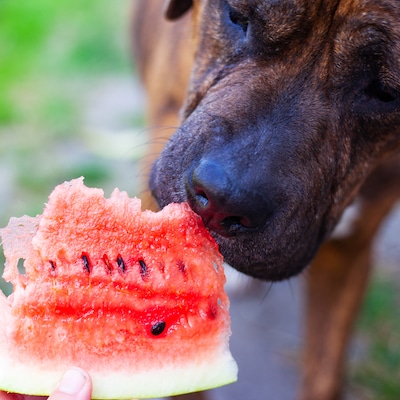Top 16 Fruits Dogs Can Eat Safely
Are you looking for a list of what fruits dogs can eat safely? We list some of the most popular fruits that dogs can eat without getting sick. One of the reasons people come to us or visit an emergency vet is because their dog had eaten something they shouldn’t have. When it comes to fruits, thankfully many are safe for your canine. This does not mean your dog can’t get an upset stomach or possibly diarrhea, but these fruits should do no harm. Just like humans, fruits can be a healthy snack for your dog and can even help regulate their bowl movements. The first rule to follow – moderation. Don’t let your dog over eat fruits, just because they can. Some fruits are higher in sugar than others and can cause problems if overeaten such as diarrhea.

Apples
- Dogs can eat apples. One great thing about Apples is that they are loaded with vitamins C, fiber, calcium and phosphorus. They are safe fruit that your dog can enjoy and can be a great source of fiber for older dogs. Just be sure to take out the core and seeds as the seeds can contain small amounts of cyanide. It is also best to cut up the apple into smaller pieces. If your dog finds a whole apple in your yard and eats it, there is no cause for alarm.
Apricots
- Just like apples, Dogs can eat Apricots without getting sick. And just like apples you will want to remove the seed before feeding it to your dog. Apricot seeds contain a small amount of cyanide which is only harmful if eaten in large portions. To do any kind of harm your dog would have to eat a large amount of apricot seeds in a very short period of time.
Bananas
- Dogs can eat bananas. Bananas are a great source of potassium, vitamins, biotin and fiber for your dog. It is recommended that you moderate how much your dog eats as bananas are high in sugar. Give them as a small treat but don’t over do it. Because of the sugar your dog might really like bananas. Some people ask if the banana peel is OK for the dog to eat. The general rule is to avoid peels as they can be hard to digest, cause blockage and some might have toxins on the outer skin. If your dog ends up eating the peel, do not be alarmed. Watch them and make sure they pass it within a few days.
Blueberries
- Dogs can eat Blueberries. This fruit is classified as a superfood, rich in antioxidants, high vitamin C, fiber and phytochemicals. These actually makes a great treat for dogs and can be a great alternative to store bought treats. If you are wondering how many blueberries your dog can eat in one day, keep it to no more than 10% of their daily diet.
Cantaloupes
- Dogs can eat Cantaloupes. This fruit is a great source of dietary fiber, vitamin B6, niacin, folate, vitamin A, vitamin C, and potassium. The only problem with cantaloupe is that they are high in sugar and should be moderated with overweight dogs or dogs who have diabetes. Even the seeds are harmless. The part of the cantaloupe you want to avoid is the outer shell. It can cause digestive problem and cause upset stomachs. If you want to feed your dog cantaloupe, be sure to do it in moderation.
Cranberries
- Dogs can eat Cranberries, in moderation. You do not want to overfeed your dog cranberries as they can upset your dog’s stomach. If you give your dog cranberries, make sure they are 100% cranberries and not raisins or a mixture of cranberries and raisins as raisins are toxic to dogs. Some dogs might not like cranberries because of the flavor and tartness of this treat.
Cucumbers
- Dogs can eat Cucumbers. Cucumbers are technically a fruit and not a vegetable. This fruit is safe for your dog and is a very low calorie treat. They have vitamins K, C and B1, potassium, magnesium and biotin, all great things for your dog. The only two issues with cucumbers are that they are easy to be overfed to your dog and if they are not cut up, they can pose a choking hazard.
Mangoes
- Dogs can eat Mangoes. This sweet treat has high in fiber, as well as vitamin A, B6, C, and E. They are packed full of great nutrients your dog needs and will love. The outer skin of mangoes can be a little rough or harder to digest so its recommended to remove the skin as well as the pit. Just like apples and apricots, their seed can contain small amounts of cyanide. The pit can also become a choking hazard because of how big and hard they are. You also want to limit mangoes for your canine as they are high in sugar.
Oranges
- Dogs can eat Oranges. The simple answer is yes, your canine can eat oranges and they will probably like this treat. The problem with oranges is they are high in sugar which can cause GI upset. Veterinarians say that the citric acid in oranges is not a problem for dogs, but could be for cats. It is recommended that you throw away the peel and seeds of the orange and only give your dog the ‘flesh’, juicy part.
Papayas
- Dogs can eat Papayas. If you see the pattern of similar fruit you will know that the seed should be thrown away. It can cause digestive issues or intestinal blockage, which then may require a visit to an emergency veterinarian. The seeds also contains small amounts of cyanide. If your dog decides to eat a bunch of papayas, just watch them over the next few days.
Peaches
- Dogs can eat Peaches. This fruit is a great source of fiber and vitamin A. It can also help fight infections and in moderation can be a great treat for your canine. Just like other fruits with large seeds, your dog should not eat the peach’s pit as it can also contain small amounts of cyanide. Be sure you only give your dog fresh peaches and not canned or processed peaches as those will also have additional sugars or syrups in them. Those additional sugar will cause your dogs stomach to be upset and can lead to diarrhea.
Pears
- Dogs can eat Pears. This fruit can be a great snack for your canine as it has vitamin C, vitamin A, and fiber. Be sure you only feed your dog fresh pears and not canned pears as those will have extra sugar and syrups. It is also recommended to cut up pears into smaller chunks as they can be harder to chew and swallow for a dog. Be sure you limit pears to about 10% of your dogs daily food intake, otherwise you might experience an upset stomach.
Pineapple
- Dogs can eat Pineapple. The trick with pineapple is to feed your dog the fleshy part and not the peel or crown. This fruit has a ton of great vitamins and nutrients such as vitamin C, thiamin, riboflavin, niacin, vitamin B6, folate and the list goes on. The problem with pineapple is that it contains a significant amount of sugar. This can lead to digestive problems, especially diarrhea. It is best to give your dog a little amount of pineapple to see how they react to it first. If they have a sensitive stomach you will know.
Raspberries
- Dogs can eat Raspberries. This fruit is great for dogs because it contains antioxidants. They are lower in sugar and high in fiber, potassium, manganese, copper, folic acid, iron, and magnesium. For older dogs, this fruit is great because of the anti-inflammatory properties. There is one danger with raspberries and that is xylitol. It is an all natural sweetener found in fruits. It is safe for humans but can be toxic to dogs. This is only if you are over feeding your dog raspberries. Limiting their intake to less than 1 cup at a time can allow them to get the other benefits of this fruit.
Strawberries
- Dogs can eat Strawberries. This is another great fruit that your canine can eat and is full of antioxidants, high in fiber and vitamin C. By giving your dog strawberries you can also be helping to strengthen their immune system, as well as helping to slow their aging process. Strawberries also help whiten your dog’s teeth. The only issue you need to watch out for is that strawberries contain a large amount of sugar, so moderation is key.
Watermelon
- Dogs can eat Watermelon. This fruit is low in calories and packed with nutrients, vitamins A, B6, and C, and potassium. You will want to throw away the rind and remove the seeds before feeding it to your dog. Too many seeds can lead to intestinal blockage which then leads to a whole different problem. Watermelon is also a great way to help keep your dog hydrated during hot summer days.

Keeping your dog healthy and safe is extremely important. We don’t want to see your dog going to an emergency vet because they ate something they should not have. The main point of this article is that moderation is key keeping your canine healthy. Just like humans you don’t want to overeat fruits because many of them are high in sugars. Too much sugar can lead to diabetes and other health problem.

Leslie Brooks graduated from the University of Tennessee College of Veterinary Medicine in 2012. After graduation she moved to Indianapolis to do an intensive one-year internship at a specialty practice and then began working as a small animal general practitioner. She ran her own house call practice for three years, visiting pets in people’s homes. Currently, she works part time in clinical practice and volunteering her free time to serve pets of the homeless. Read more about us here.
